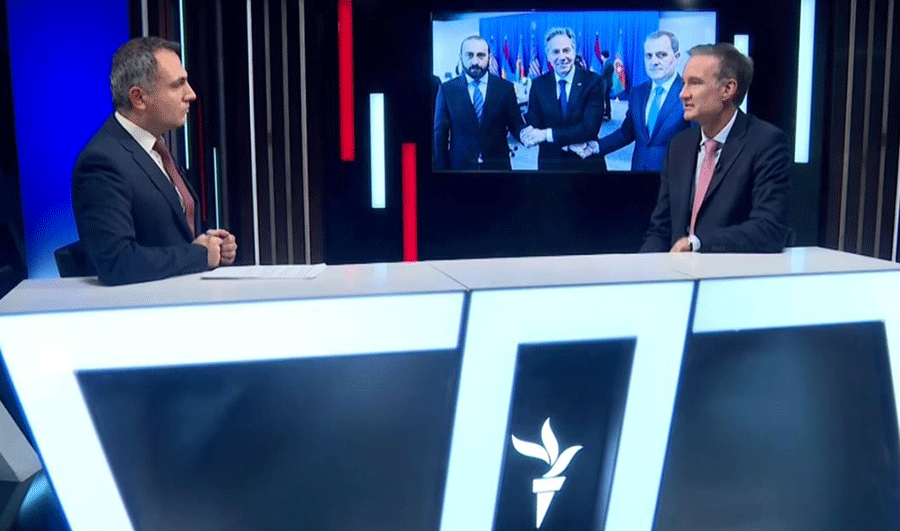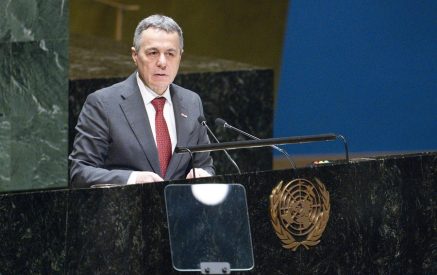Azatutyun.am. Armenia holds a “very special place” from the perspective of the Organization for Security and Cooperation in Europe (OSCE), a United States ambassador to this organization has told RFE/RL’s Armenian Service.
In an interview late last week Dr. Michael Carpenter said that Armenia has become “a model of how a country can reform itself and deepen its democratic institutions and take on rule-of-law issues in a very productive and constructive way.”
“So we see what’s happening here over the course of the last few years as a model that could be emulated elsewhere,” Carpenter said on the eve of the OSCE Parliamentary Assembly’s fall session held in Yerevan on November 18-20.
Carpenter stressed that the United States “continues to think it is extremely important for Armenia and Azerbaijan to normalize relations so that there is peace, stability in the region, and transport links are opened.”
Read also
“We think it is for the benefit of everybody and certainly for the United States to see peace and stability in this region. And so we are going to keep trying to facilitate that through the means that we have available. And we hope that the parties understand as well that this is in their interest, too,” the senior U.S. diplomat said.
In the context of Azerbaijan’s most recent refusal to engage in a meeting with Armenia in Washington citing “one-sided and biased remarks” by a senior U.S. official as a reason, Carpenter said that he “wouldn’t say that any window [of opportunity] is closed at the moment.”
“I wouldn’t put a fixed timeline to the negotiations process. And I wouldn’t have done that six months ago or a year ago. I think it is important that all parties redouble efforts to achieve durable peace and security in the region because again that and upholding human rights and democracy is critically important for us. So we are going to keep doing it,” he said.
Referring to the recent U.S. efforts to help Armenia and Azerbaijan make progress in the negotiations, Carpenter said that Washington will continue to offer “good offices” to the parties, adding that “ultimately it is up to the parties to decide which process is most conducive to their interests.”
At the same time, the U.S. ambassador to the OSCE said that “Russia is not a reliable party in negotiations.”
“Russia has proven over the course of the last 18 months plus that it is not reliable in any sphere, having violently and brutally assaulted its neighbor [Ukraine] and not just that, but having lied about various other international commitments and having broken those commitments repeatedly in recent years,” Carpenter said.
The U.S. diplomat would not be drawn into a discussion on what the OSCE’s Minsk Group has done in the past in the way of promoting a negotiated peace between Armenia and Azerbaijan in their conflict over Nagorno-Karabakh. “But clearly until we have a sustainable, durable peace deal and agreement between Armenia and Azerbaijan, our work will not be finished,” he said.
Carpenter said he was not aware of any contacts in the Minsk Group format, but acknowledged that “the Minsk Group continues to exist until the parties decide otherwise.”
After the 2020 war in Nagorno-Karabakh that resulted in Azerbaijan’s retaking all seven surrounding districts and establishing control over chunks of the Armenian-populated region proper, Baku claimed that the OSCE Minsk Group co-headed by Russia, the United States, and France had ceased to exist.
The apparent dysfunctionality of the group deepened after Russia’s invasion of Ukraine in February 2022 that was followed by Western condemnation of Moscow’s actions and support for Kyiv.
Prospects of renewed contacts between the West and Russia, which deployed a peacekeeping force in Nagorno-Karabakh under the terms of a 2020 Moscow-brokered ceasefire agreement, became even more vague after Azerbaijan established full control over the region in a lightning offensive in September this year that caused virtually the entire local Armenian population to flee to Armenia.
























































